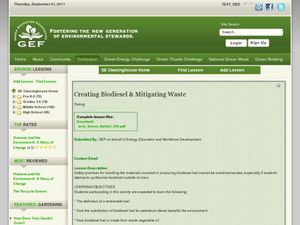Curated OER
Chemical Formulas for Molecules
Newcomers to chemistry compare hydrogen peroxide to water, realizing that the difference of one oxygen atom significantly affects the chemical properties. Other pairs of compounds and their formulas are also examined. A few chemical...
Curated OER
Writing Chemical Formulas
Students study how to write chemical fomulas by reviewing the combinations atoms form into compounds. They write a procedure to test various substances and name the compounds and write formulas. As they construct models for formulas and...
Curated OER
Up and Atom
"Up and Atom" is a mini-unit introducing middle-schoolers to the wonders of elements. Participants draw atom models, examine the periodic table, compare samples of metals to nonmetals, identify unknown elements, and more! The beginning...
Curated OER
Chemicals, Chemicals, Everywhere
Students divide substances into categories: made of chemicals/not made of chemicals, synthetic/naturally occurring, and toxic/nontoxic. They observe a mystery chemical and determine what precautions they need to take when handling an...
Curated OER
How Stuff Is Put Together (Chemical Bonding)
Fourth graders participate in a simple experiment that shows the ratio of elements that make up water.
Curated OER
Chemical Formulas
Students examine the structure of molecules, their formula, and percentage composition of each element in the compound. They construct an organic compound with different functional groups using a modeling kit, and draw a 3-D structure...
Chymist
Esters: An Introduction to Organic Chemistry Reactions
Scratch and sniff an introduction to organic chemical reactions. A creative lesson has individuals study the esters commonly used in scratch-and-sniff stickers and advertisements. Following the lab procedure, scholars create the organic...
Beyond Benign
Cookie Equations
Cookies and chemical equations have a lot in common! Using cookies as a reference, scholars learn to balance chemical equations. Pieces of the cookies represent different parts of the compounds and elements. This is the sixth installment...
Curated OER
Chemical Bonding
Students classify compounds as ionic or covalent. For this chemical bonding lesson plan, students experiment with 6 chemical compounds. They test physical properties such as the melting point, the solubility and the electrical...
Curated OER
Matter, Matter
Students define vocabulary related to the parts of the atom. In this matter lesson, students navigate the web to find the structure and the forces that affect atoms. Students complete an experiment with positive and...
Curated OER
The Effects of Temperature on Chemical Mixtures
Students explore chemical cahnges and the effect of temperature on chemical mixturees, They make observations of the behavior and appearance of certain chemical mixtures and reactions.
Curated OER
How Are The Properties of Covalent Compounds Influenced By Chemical Bonding?
High schoolers work together to observe the bond lengths of single, double and triple bonds. They make their own predictions about the strength of the bonds and chemical reactions. They answer discussion questions to complete the...
Curated OER
Elements and Compounds
Eighth graders explore the chemical and physical properties of a variety of elements in a lab setting. They organize the data they collect onto a spreadsheet and then choose one element from the periodic table to research. They...
Curated OER
Differentiate Elements, Compounds, and Mixtures
Pupils examine the differences between elements, compounds and mixtures. Using diagrams, they compare and contrast atoms and molecules and describe various chemical reactions. They distinguish the differences between ionic and covalent...
Curated OER
Recognizing and Describing Chemical Changes
Seventh graders distinguish between physical and chemical changes in both natural and technological settings. They identify the reactants and products for a given chemical reaction. they then write simple chemical equations given the...
Curated OER
The Elements
Fifth graders explore the differences between elements. In this elements and atoms lesson students complete an activity that shows how chemicals react to a flame test.
Curated OER
Boot Reer Root Beer
Fifth graders investigate chemical reactions. In this physical science lesson, 5th graders make dry ice root beer and identify the type of change that occurs to the root beer mixture.
Curated OER
Polymers Lab: Bouncy Ball and Slime
Eighth graders investigate chemical reactions to produce polymers. For this polymers lesson plan, 8th graders experiment with sodium silicate and ethyl alcohol to make a polymer. They also experiment with borax and glue to make a...
Teach Engineering
Engineering and the Periodic Table
Elements, to the rescue! Scholars first review the periodic table, and then learn about the first 20 elements and their properties and uses in the fourth of six lessons in the Mixtures and Solutions unit. Applying their newfound...
Curated OER
Physical and Chemical Changes
Sixth graders complete several experiments about chemical and physical changes. In this physical and chemical science instructional activity, 6th graders complete 6 experiments about chemical and physical changes. Students examine the...
Cornell University
The Making of Macromolecules
Compare and contrast macromolecules made from the same elements. Young scholars learn how the structure of a molecule has as much influence on a compound as the elements in the molecule. They experiment with molecular model kits to...
Curated OER
Electron Sqare Dance
Students participate in an Electron Square Dance in which they act the part of atoms. They follow the structure of different atoms suggested by the teacher.
LABScI
Freezing Point Depression: Why Don’t Oceans Freeze?
Can you go ice fishing in the ocean? Learners examine the freezing point of different saltwater solutions. Each solution has a different concentration of salt. By comparing the freezing points graphically, they make conclusions...
Curated OER
Creating Biodiesel and Mitigating Waste
Biotechnology pros produce their own biofuel using waste oil and fresh vegetable oil. They test the quality of their product using titration techniques and pH analysis. They write their observations and report their findings. Be aware...























